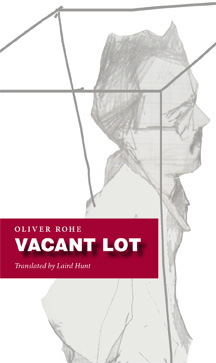Vacant Lot by Oliver Rohe, translated by Laird Hunt. Counterpath Press, 2011.
 “Then I was king and now I’m no more than a ghost,” says the narrator in Oliver Rohe’s novel Vacant Lot. Now “I pass haggardly through trenches at the periphery of agitation and take refuge in a penumbra that is menaced from all sides.” Translated from the French by novelist Laird Hunt, at its simplest Vacant Lot is about a soldier who, after losing a civil war, must watch the city rebuild around him. It is, to quote an interview with the author, “the mind of a former war lord who, when peace was declared, lost everything: his social standing, his life as he knew it, his former privileges” (66). At only 88 pages, Vacant Lot is a beautiful, little volume with much to say to a world always on the brink of war.
“Then I was king and now I’m no more than a ghost,” says the narrator in Oliver Rohe’s novel Vacant Lot. Now “I pass haggardly through trenches at the periphery of agitation and take refuge in a penumbra that is menaced from all sides.” Translated from the French by novelist Laird Hunt, at its simplest Vacant Lot is about a soldier who, after losing a civil war, must watch the city rebuild around him. It is, to quote an interview with the author, “the mind of a former war lord who, when peace was declared, lost everything: his social standing, his life as he knew it, his former privileges” (66). At only 88 pages, Vacant Lot is a beautiful, little volume with much to say to a world always on the brink of war.
In an unnamed country, watching the sea from an armchair, the narrator spends his days in a decrepit room. Being the last domain of his kingdom, it is, to him, the only evidence of his existence – “Here I tell myself maybe I’ve had a past a history a life” (1). At its height it was the same room where, as “king,” he had hung hooks from the ceiling and installed, on the floor, drainage channels. Here he recalls gang-raping young women “whose cries [would] only increase our determination” (32). Here, with his friends, he remembers celebrating his work with “a last coffee next to the sea before returning to our handsome apartments” (32-33). But, alas, “[n]one of us had predicted the collapse the end of our collective existence” (49).
“In a matter of hours it was over,” he says of the war’s end, “and my friends had been annihilated by electroshock” (49-50). Losing the power and meaning he cherished, he could have followed his peers into exile but instead chose to stay where “outside I’m no longer anything and here, in my armchair, my agony is unending” (15). Overnight he became a warrior without a war and now (as he often repeats) can do nothing but wait for death.
Watching the ruins once again become a city, the narrator grows anxious. All he can think about are the 1,412 men who crossed through this room. He claims no right to rest for what he has done – ever – and when he tries “my entire organism effectively rises up against me and my jaw snaps shut and I bite my tongue and it bleeds in my mouth” (29). Thus not only has he lost control of his old life, he has also lost something more: “How can I muzzle it, this body of mine” (29)?
In a moment of clarity he describes his predicament:
I’m on a cycling track in the middle of a white arena and there’s no crowd. Or there is. Old men who don’t move. They are perfectly motionless and silent – like wallpaper. All I hear are the announcer’s orders. His rumbling voice like an idling engine. He yells at me to keep going. I’m wearing number 1412. … I’m not allowed to stop. Something is hot on my heels. Or maybe not. … Sweat floods my eyes wets my lips and it’s harder and harder to pedal. I don’t know why I’m pedaling nor when my race will end (46-47; italics mine).
Perhaps the better question is not when his race will end but whose race it was to begin with? Even for the narrator’s atrocities, reading Vacant Lot one gets the impression that Rohe’s “war lord” was not nor ever destined to become one of the (supposed) Great Men who drive history. Despite his claim to the contrary, we are not watching the fall of some great “King” as much as we are a knight in another King’s court. We are not following the rapid, meandering thoughts of a Hitler, Hussein or Gaddafi; instead, we are watching a young man made old who built his life on the losing side. (Had the war ended differently one imagines him being recognized as a hero).
Rohe’s narrator could be any young male swept up into conflict: he is the war criminal too low-ranking to be made into an example, the loyalist without anyone to be loyal to, the patriot who confuses ideology with morality. Above all, he is the zealot who would die for the cause but who lived to see the cause die first. With his world gone all he can do is watch from this last domain the pages of history turn. The shadow of the city looms over him until, at last, the monuments are built “[s]o that the memory of people of my marginal species are definitively swept away” (57).
What follows the tragedy of civil war is the tension of civil peace. When the war is over and reconstruction begins the worst (often) escape, and the neighbors who raised arms against one another must lay them down. Revolutionary or loyalist, both are victims of the war and so, walking the same road home, can only step in silence. Together they must begin their lives anew as heroes, villains – humans. While the civilians caught in the crossfire carry the war’s scars, the victors rebuild the world in their image as the defeated watch their own recede. The new city becomes a metropolis and the old regime grasps for whatever is left – even if it is just a vacant lot.




Elias uddin says
Well-written. Feel like reading the Vacant Lot: ‘ the zealot who would die for the cause but who lived to see the cause die first – the tragedy of civil war – the tension of civil peace – victims of the war walking the same road home…… step[ping] in silence – the civilians caught in the crossfire carry[ing] the war’s scars – the victors rebuild[ing] the world in their image as the defeated watch their own recede.’
Wish I had a copy at hand!